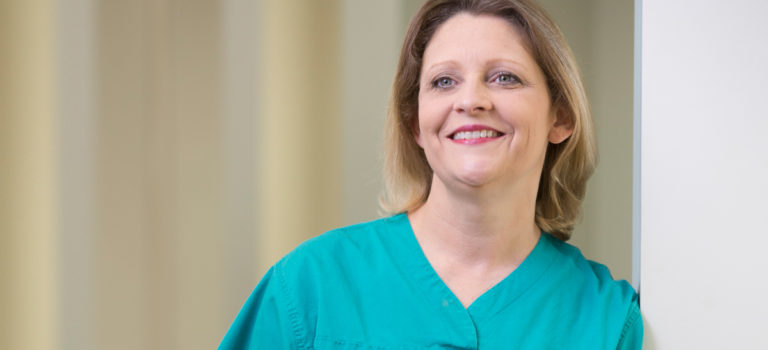Sue* and I met on November 11, 2015, shortly after she was diagnosed with cervical cancer. She walked into my office with her bold, outspoken personality, but I could tell that deep down she was scared and extremely anxious. Externally, she was loud, funny and strong; inside, she was struggling to find strength and resolution.
In getting to know her, I learned Sue was a free spirit, a wanderer who lived life on a whim, a characteristic that has led her through a colorful past and a trait that would also leave her with few close friends and nearby family members. At the time of us meeting, she was overcoming pain and heartache, sorting through a difficult family situation and facing a cancer unlike any other. It didn’t take me long to figure out that I would become very involved in her journey.
Sue would call me often, sometimes seeking medical advice and assistance, other times just to talk and have someone on the other end to listen. More than anything, she needed to know someone believed in her and trusted she was making good decisions. I did what I could to support her by providing educational information, available resources and support in any way I could. I was happy to help and be a part of her support group.
I’ve been there for her through it all, from chemotherapy and radiation to periods of surveillance, and even now as she transitions into hospice. I have been there as she struggled and when she succeeded, continuing to always be her cheerleader and sometimes stepping out of my role as nurse navigator and more into the role of friend.
I remember vividly when Sue told me that she and friend decided to adopt an abused puppy that was in need of a home. Looking back, I’m not sure who really saved whom, but both Sue and the puppy needed something that they could only get from the other. Sue provided the dog a safe, stable environment. In turn, the puppy provided Sue unconditional love and a distraction from her cancer. Living near Sue, I would pass her home and see the puppy outside on a tie out during the day. I would often stop and untangle the puppy, as she had the tendency to get herself caught up. After a few times of doing this, I bought Sue a better quality tie out for the dog. She expressed her sincere gratitude and explained how difficult it was to leave the puppy outside while she was away at work. As the summer heated up, I would often see the dog outside and thought of Sue’s concerns for her beloved pup. I decided to get a crate for the dog that would allow it to stay inside while Sue was at work, that way she wouldn’t be out in the heat and Sue’s worry could be eased. Sue’s excitement and appreciation for these small actions was overwhelming.
It was then that I realized that sometimes, people are not the only support for a person. While I was happy to be a member of Sue’s support team, I knew that puppy was just as important. The point is that people with cancer need support. In their minds, there is “before cancer” and “after cancer,” but they often need us most in the in-between. That support can come from many different sources and in many different forms, ranging from emotional to physical and financial to spiritual. And sometimes, it is the littlest things that mean the most.
It’s not always an easy thing for people to ask for help, so I do whatever I can. I feel blessed to be in the position I’m in and to be able to be a person’s “someone” among all the other “someone’s.”
My name is Ashley Marks, I am a GYN Oncology Nurse Navigator at Woman’s Hospital, and I am the sisterhood.
*Patient name has been changed out of respect for her privacy.

